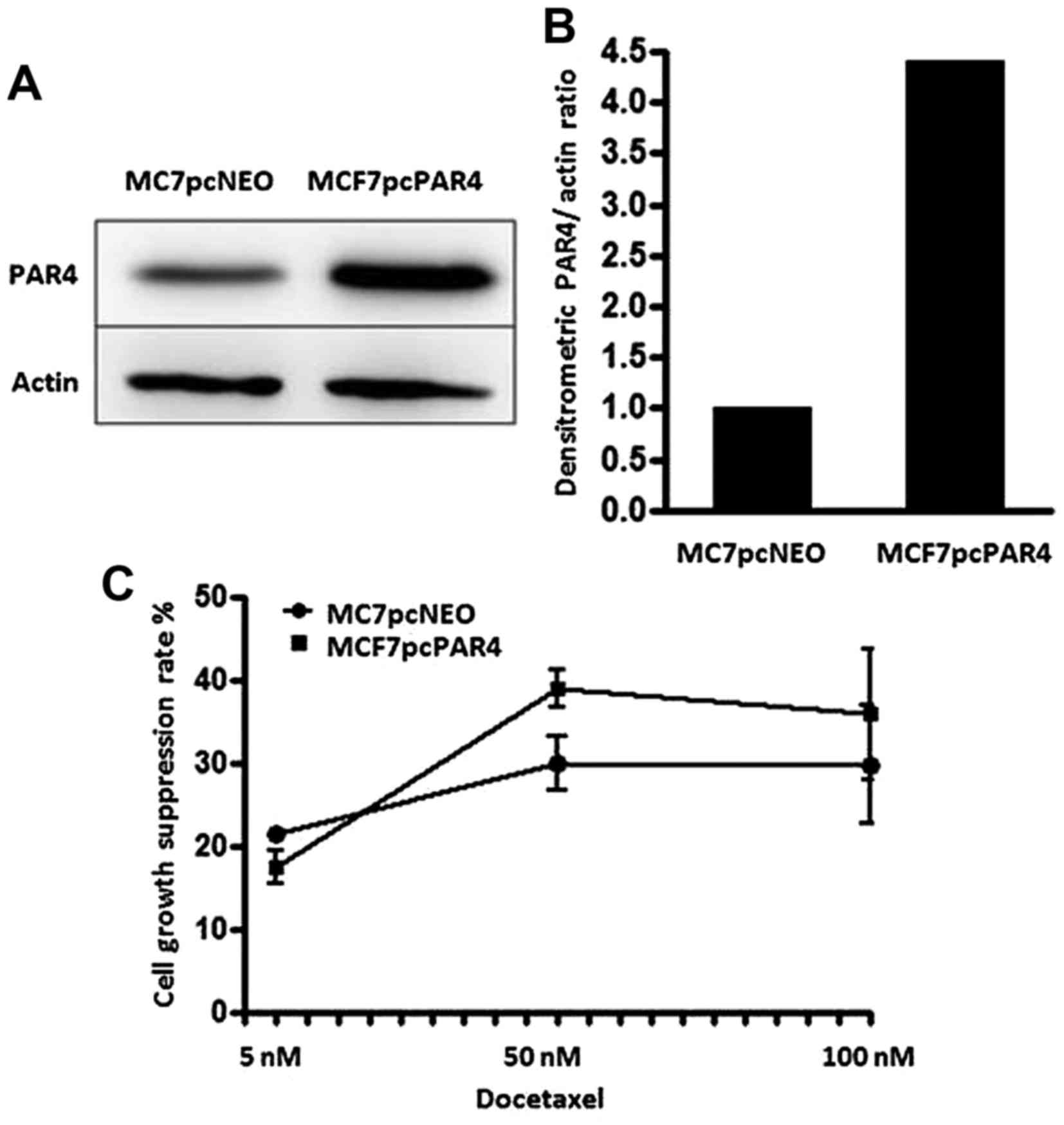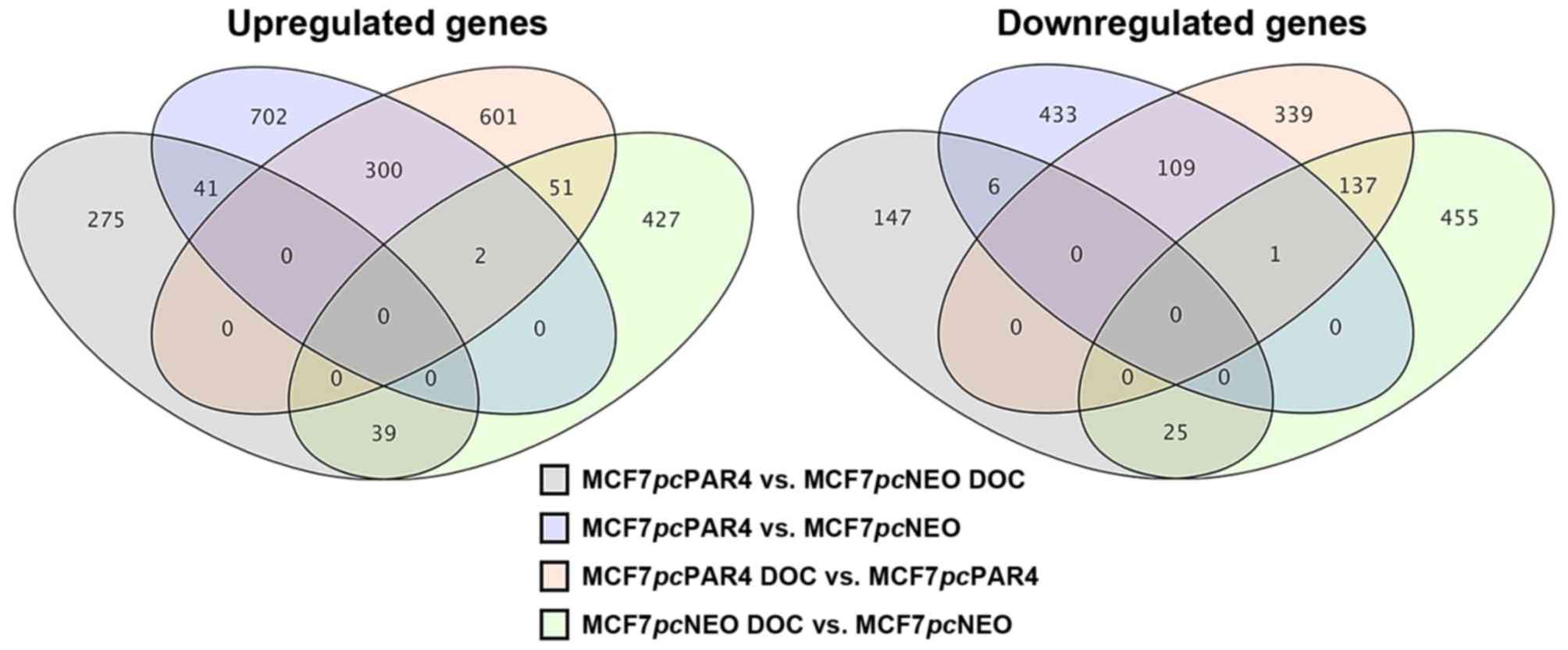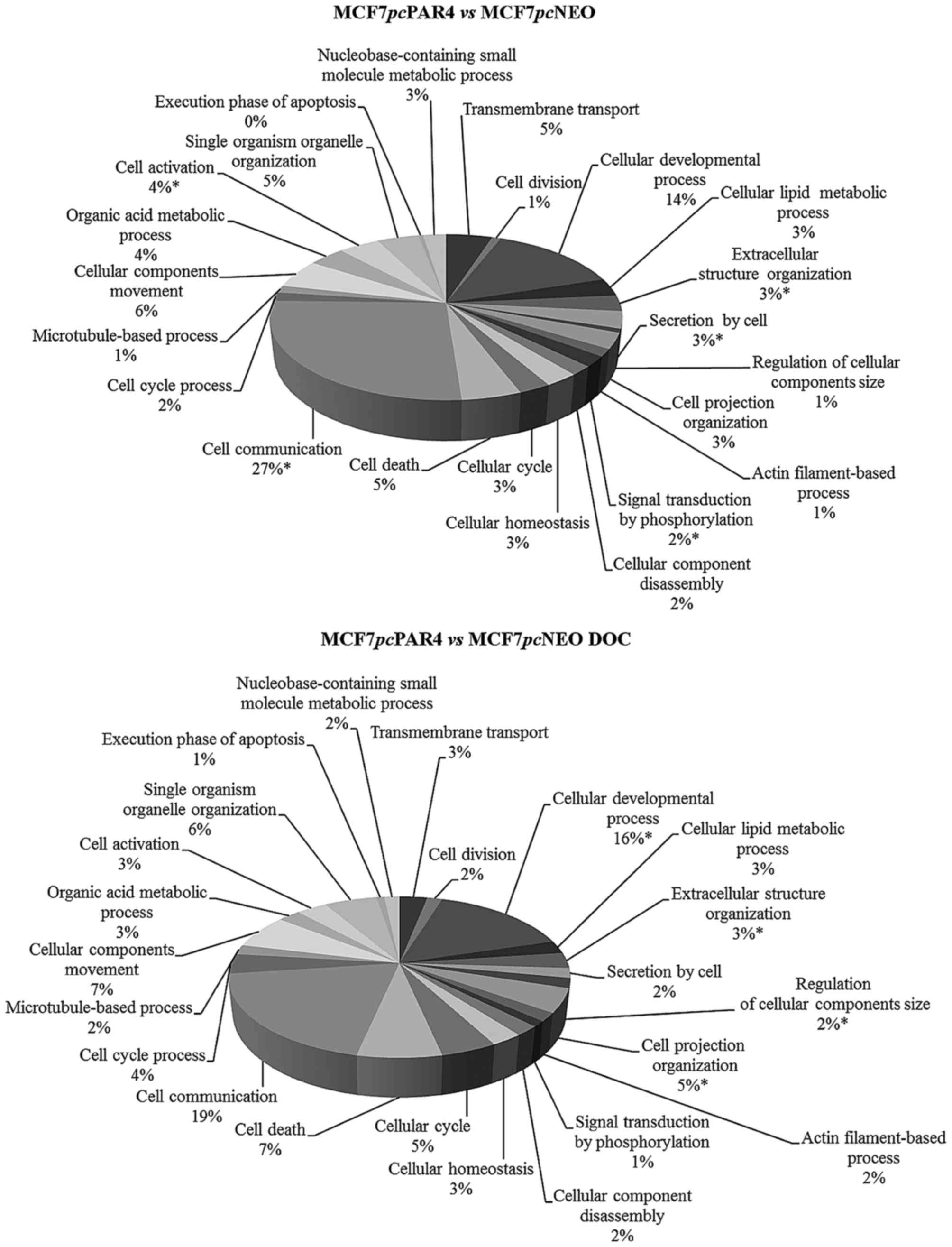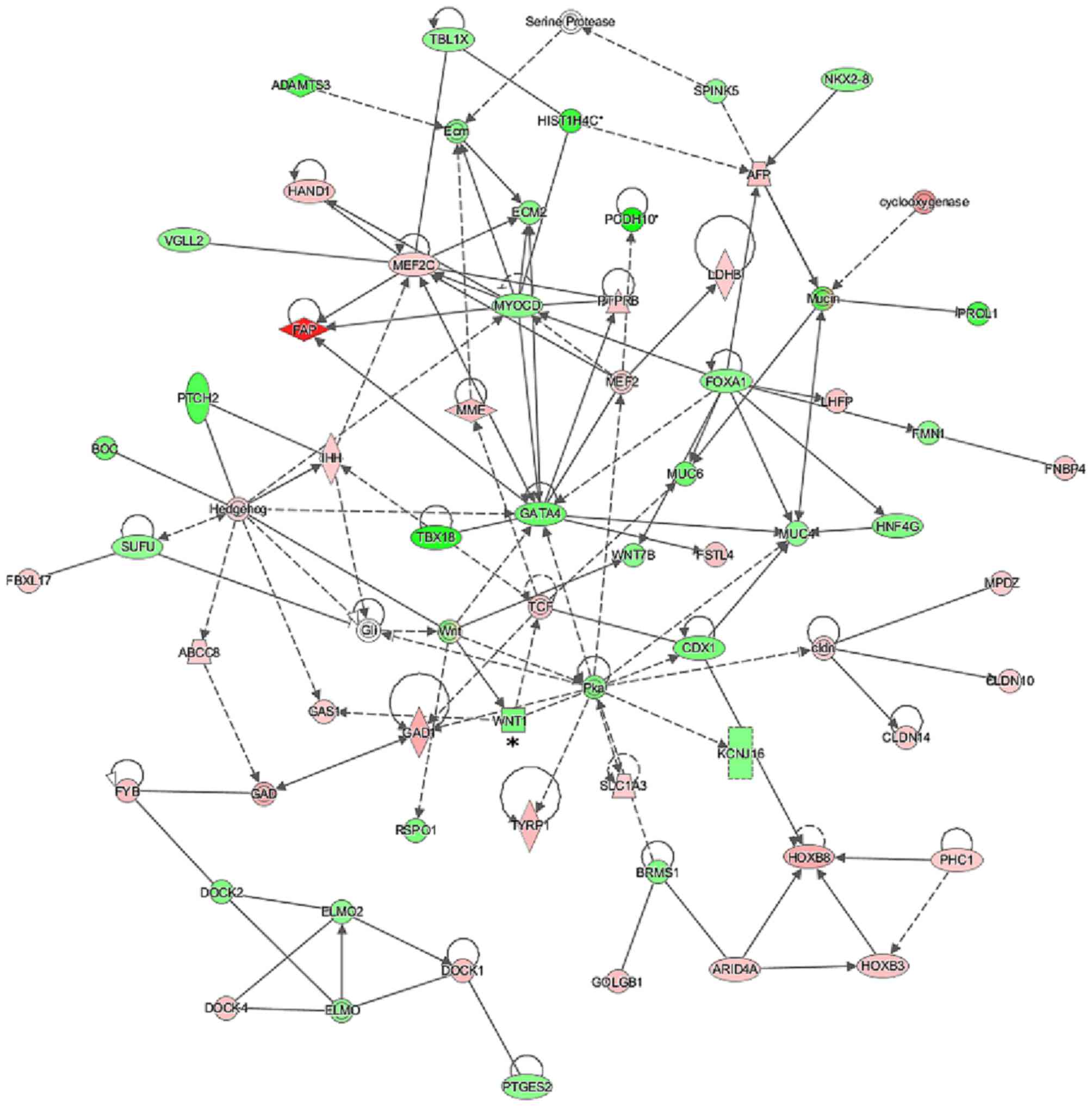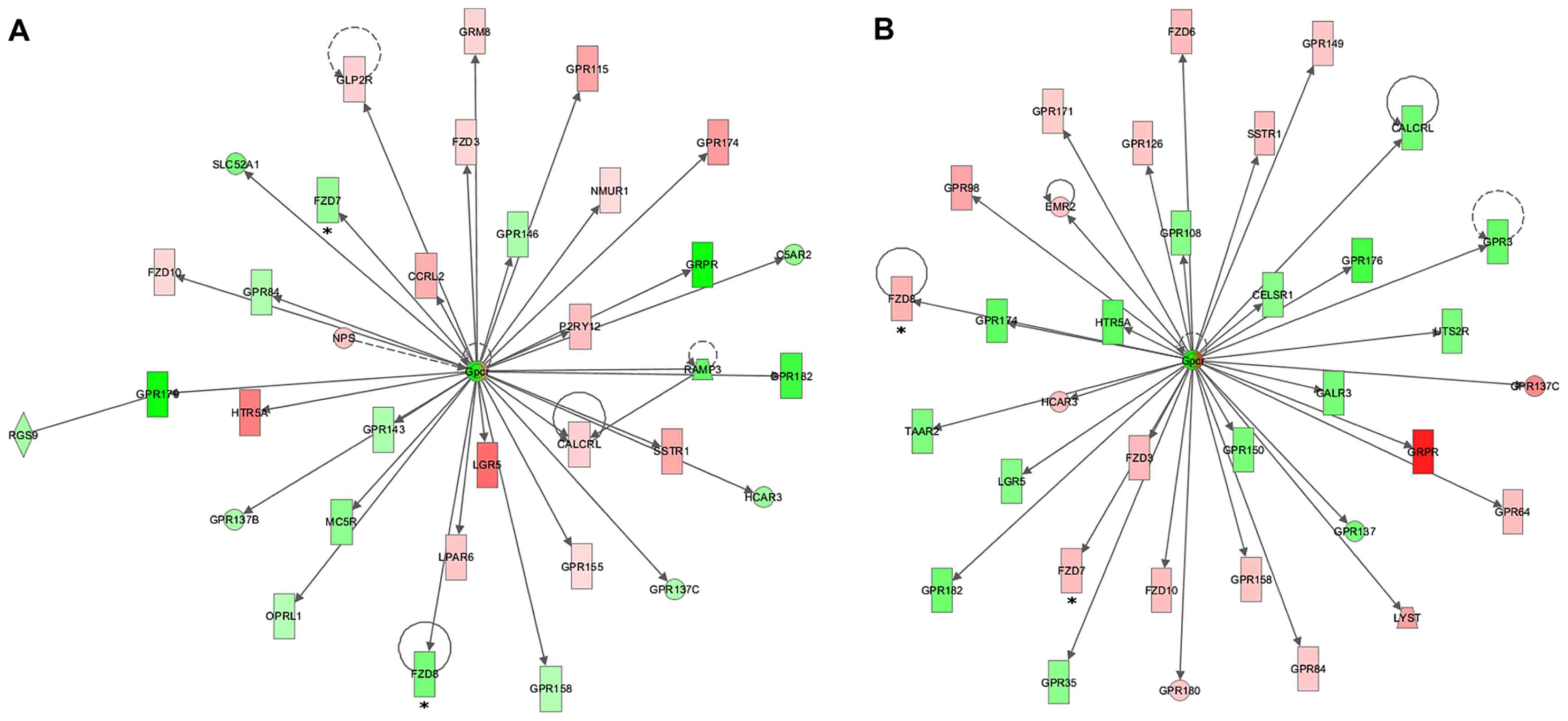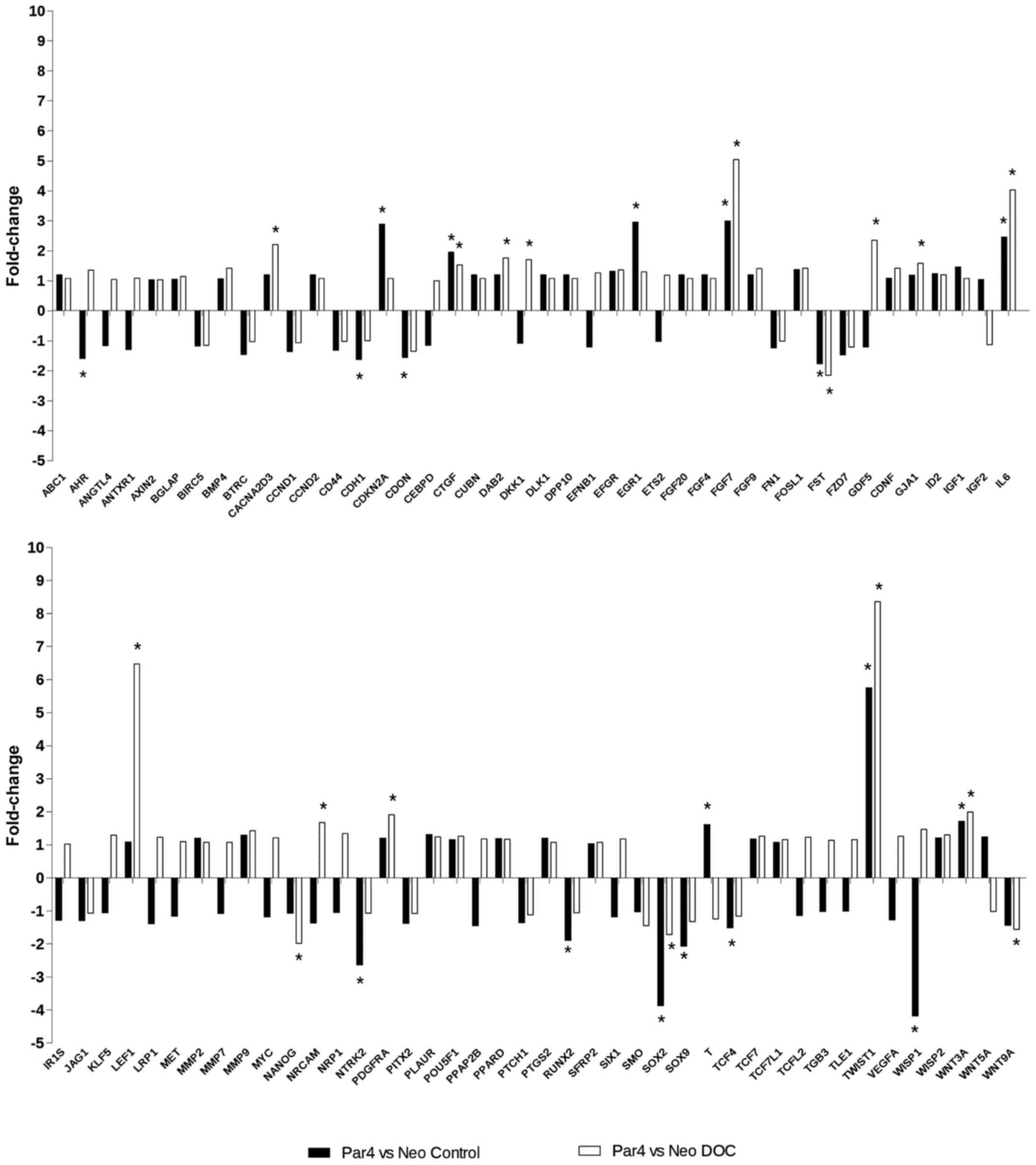|
1
|
Parkin DM, Bray F, Ferlay J and Pisani P:
Global cancer statistics, 2002. CA Cancer J Clin. 55:74–108. 2005.
View Article : Google Scholar : PubMed/NCBI
|
|
2
|
De Laurentiis M, Cancello G, D'Agostino D,
Giuliano M, Giordano A, Montagna E, Lauria R, Forestieri V,
Esposito A, Silvestro L, et al: Taxane-based combinations as
adjuvant chemotherapy of early breast cancer: A meta-analysis of
randomized trials. J Clin Oncol. 26:44–53. 2008. View Article : Google Scholar : PubMed/NCBI
|
|
3
|
Murray CJ, Vos T, Lozano R, Naghavi M,
Flaxman AD, Michaud C, Ezzati M, Shibuya K, Salomon JA, Abdalla S,
et al: Disability-adjusted life years (DALYs) for 291 diseases and
injuries in 21 regions, 1990–2010 a systematic analysis for the
Global Burden of Disease Study 2010. Lancet. 380:2197–2223. 2012.
View Article : Google Scholar : PubMed/NCBI
|
|
4
|
Zhao Y and Rangnekar VM: Apoptosis and
tumor resistance conferred by Par-4. Cancer Biol Ther. 7:1867–1874.
2008. View Article : Google Scholar : PubMed/NCBI
|
|
5
|
Sells SF, Han SS, Muthukkumar S, Maddiwar
N, Johnstone R, Boghaert E, Gillis D, Liu G, Nair P, Monnig S, et
al: Expression and function of the leucine zipper protein Par-4 in
apoptosis. Mol Cell Biol. 17:3823–3832. 1997. View Article : Google Scholar : PubMed/NCBI
|
|
6
|
Hebbar N, Wang C and Rangnekar VM:
Mechanisms of apoptosis by the tumor suppressor Par-4. J Cell
Physiol. 227:3715–3721. 2012. View Article : Google Scholar : PubMed/NCBI
|
|
7
|
Boehrer S, Chow KU, Beske F,
Kukoc-Zivojnov N, Puccetti E, Ruthardt M, Baum C, Rangnekar VM,
Hoelzer D, Mitrou PS, et al: In lymphatic cells par-4 sensitizes to
apoptosis by down-regulating bcl-2 and promoting disruption of
mitochondrial membrane potential and caspase activation. Cancer
Res. 62:1768–1775. 2002.PubMed/NCBI
|
|
8
|
Chakraborty M, Qiu SG, Vasudevan KM and
Rangnekar VM: Par-4 drives trafficking and activation of Fas and
Fasl to induce prostate cancer cell apoptosis and tumor regression.
Cancer Res. 61:7255–7263. 2001.PubMed/NCBI
|
|
9
|
Gurumurthy S, Goswami A, Vasudevan KM and
Rangnekar VM: Phosphorylation of Par-4 by protein kinase A is
critical for apoptosis. Mol Cell Biol. 25:1146–1161. 2005.
View Article : Google Scholar : PubMed/NCBI
|
|
10
|
Burikhanov R, Zhao Y, Goswami A, Qiu S,
Schwarze SR and Rangnekar VM: The tumor suppressor Par-4 activates
an extrinsic pathway for apoptosis. Cell. 138:377–388. 2009.
View Article : Google Scholar : PubMed/NCBI
|
|
11
|
Boghaert ER, Sells SF, Walid AJ, Malone P,
Williams NM, Weinstein MH, Strange R and Rangnekar VM:
Immunohistochemical analysis of the proapoptotic protein Par-4 in
normal rat tissues. Cell Growth Differ. 8:881–890. 1997.PubMed/NCBI
|
|
12
|
Gurumurthy S and Rangnekar VM: Par-4
inducible apoptosis in prostate cancer cells. J Cell Biochem.
91:504–512. 2004. View Article : Google Scholar : PubMed/NCBI
|
|
13
|
Sells SF, Wood DP Jr, Joshi-Barve SS,
Muthukumar S, Jacob RJ, Crist SA, Humphreys S and Rangnekar VM:
Commonality of the gene programs induced by effectors of apoptosis
in androgen-dependent and -independent prostate cells. Cell Growth
Differ. 5:457–466. 1994.PubMed/NCBI
|
|
14
|
Lucas T, Pratscher B, Krishnan S, Fink D,
Günsberg P, Wolschek M, Wacheck V, Muster T, Romirer I, Wolff K, et
al: Differential expression levels of Par-4 in melanoma. Melanoma
Res. 11:379–383. 2001. View Article : Google Scholar : PubMed/NCBI
|
|
15
|
Cook J, Krishnan S, Ananth S, Sells SF,
Shi Y, Walther MM, Linehan WM, Sukhatme VP, Weinstein MH and
Rangnekar VM: Decreased expression of the pro-apoptotic protein
Par-4 in renal cell carcinoma. Oncogene. 18:1205–1208. 1999.
View Article : Google Scholar : PubMed/NCBI
|
|
16
|
Brieger A, Boehrer S, Schaaf S, Nowak D,
Ruthardt M, Kim SZ, Atadja P, Hoelzer D, Mitrou PS, Weidmann E, et
al: In bcr-abl-positive myeloid cells resistant to conventional
chemotherapeutic agents, expression of Par-4 increases sensitivity
to imatinib (STI571) and histone deacetylase-inhibitors. Biochem
Pharmacol. 68:85–93. 2004. View Article : Google Scholar : PubMed/NCBI
|
|
17
|
Kögel D, Reimertz C, Mech P, Poppe M,
Frühwald MC, Engemann H, Scheidtmann KH and Prehn JH: Dlk/ZIP
kinase-induced apoptosis in human medulloblastoma cells:
Requirement of the mitochondrial apoptosis pathway. Br J Cancer.
85:1801–1808. 2001. View Article : Google Scholar : PubMed/NCBI
|
|
18
|
Moreno-Bueno G, Fernandez-Marcos PJ,
Collado M, Tendero MJ, Rodriguez-Pinilla SM, Garcia-Cao I,
Hardisson D, Diaz-Meco MT, Moscat J, Serrano M, et al: Inactivation
of the candidate tumor suppressor par-4 in endometrial cancer.
Cancer Res. 67:1927–1934. 2007. View Article : Google Scholar : PubMed/NCBI
|
|
19
|
Ahmed MM, Sheldon D, Fruitwala MA,
Venkatasubbarao K, Lee EY, Gupta S, Wood C, Mohiuddin M and Strodel
WE: Downregulation of PAR-4, a pro-apoptotic gene, in pancreatic
tumors harboring K-ras mutation. Int J Cancer. 122:63–70. 2008.
View Article : Google Scholar
|
|
20
|
Nagai MA, Gerhard R, Salaorni S, Fregnani
JH, Nonogaki S, Netto MM and Soares FA: Downregulation of the
candidate tumor suppressor gene PAR-4 is associated with poor
prognosis in breast cancer. Int J Oncol. 37:41–49. 2010. View Article : Google Scholar : PubMed/NCBI
|
|
21
|
Méndez-López LF, Zapata-Benavides P,
Zavala-Pompa A, Aguado-Barrera ME, Pacheco-Calleros J,
Rodríguez-Padilla C, Cerda-Flores RM, Cortés-Gutiérrez EI and
Dávila-Rodríguez MI: Immunohistochemical analysis of prostate
apoptosis response-4 (Par-4) in Mexican women with breast cancer: A
preliminary study. Arch Med Res. 41:261–268. 2010. View Article : Google Scholar : PubMed/NCBI
|
|
22
|
García-Cao I, Duran A, Collado M,
Carrascosa MJ, Martín-Caballero J, Flores JM, Diaz-Meco MT, Moscat
J and Serrano M: Tumour-suppression activity of the proapoptotic
regulator Par4. EMBO Rep. 6:577–583. 2005. View Article : Google Scholar : PubMed/NCBI
|
|
23
|
Pereira MC, de Bessa-Garcia SA, Burikhanov
R, Pavanelli AC, Antunes L, Rangnekar VM and Nagai MA: Prostate
apoptosis response-4 is involved in the apoptosis response to
docetaxel in MCF-7 breast cancer cells. Int J Oncol. 43:531–538.
2013.PubMed/NCBI
|
|
24
|
Jagtap JC, Parveen D, Shah RD, Desai A,
Bhosale D, Chugh A, Ranade D, Karnik S, Khedkar B, Mathur A, et al:
Secretory prostate apoptosis response (Par)-4 sensitizes
multicellular spheroids (MCS) of glioblastoma multiforme cells to
tamoxifen-induced cell death. FEBS Open Bio. 5:8–19. 2014.
View Article : Google Scholar
|
|
25
|
Zhao Y, Burikhanov R, Qiu S, Lele SM,
Jennings CD, Bondada S, Spear B and Rangnekar VM: Cancer resistance
in transgenic mice expressing the SAC module of Par-4. Cancer Res.
67:9276–9285. 2007. View Article : Google Scholar : PubMed/NCBI
|
|
26
|
Lee TJ, Lee JT, Kim SH, Choi YH, Song KS,
Park JW and Kwon TK: Overexpression of Par-4 enhances
thapsigargin-induced apoptosis via down-regulation of XIAP and
inactivation of Akt in human renal cancer cells. J Cell Biochem.
103:358–368. 2008. View Article : Google Scholar
|
|
27
|
Kline CL, Shanmugavelandy SS, Kester M and
Irby RB: Delivery of PAR-4 plasmid in vivo via nanoliposomes
sensitizes colon tumor cells subcutaneously implanted into nude
mice to 5-FU. Cancer Biol Ther. 8:1831–1837. 2009. View Article : Google Scholar : PubMed/NCBI
|
|
28
|
Wang BD, Kline CL, Pastor DM, Olson TL,
Frank B, Luu T, Sharma AK, Robertson G, Weirauch MT, Patierno SR,
et al: Prostate apoptosis response protein 4 sensitizes human colon
cancer cells to chemotherapeutic 5-FU through mediation of an NF
kappaB and microRNA network. Mol Cancer. 9:982010. View Article : Google Scholar : PubMed/NCBI
|
|
29
|
Alvarez JV, Pan TC, Ruth J, Feng Y, Zhou
A, Pant D, Grimley JS, Wandless TJ, Demichele A and Chodosh LA;
I-SPY 1 TRIAL Investigators: Par-4 downregulation promotes breast
cancer recurrence by preventing multinucleation following targeted
therapy. Cancer Cell. 24:30–44. 2013. View Article : Google Scholar : PubMed/NCBI
|
|
30
|
Chomczynski P and Sacchi N: Single-step
method of RNA isolation by acid guanidinium
thiocyanate-phenol-chloroform extraction. Anal Biochem.
162:156–159. 1987. View Article : Google Scholar : PubMed/NCBI
|
|
31
|
Edgar R, Domrachev M and Lash AE: Gene
Expression Omnibus: NCBI gene expression and hybridization array
data repository. Nucleic Acids Res. 30:207–210. 2002. View Article : Google Scholar :
|
|
32
|
Michaelson JS and Leder P: beta-catenin is
a downstream effector of Wnt-mediated tumorigenesis in the mammary
gland. Oncogene. 20:5093–5099. 2001. View Article : Google Scholar : PubMed/NCBI
|
|
33
|
Amin N and Vincan E: The Wnt signaling
pathways and cell adhesion. Front Biosci (Landmark Ed). 17:784–804.
2012. View Article : Google Scholar
|
|
34
|
Dijksterhuis JP, Petersen J and Schulte G:
WNT/Frizzled signalling: receptor-ligand selectivity with focus on
FZD-G protein signalling and its physiological relevance: IUPHAR
Review 3. Br J Pharmacol. 171:1195–1209. 2014. View Article : Google Scholar :
|
|
35
|
Mylona E, Vamvakaris I, Giannopoulou I,
Theohari I, Papadimitriou C, Keramopoulos A and Nakopoulou L: An
immunohistochemical evaluation of the proteins Wnt1 and glycogen
synthase kinase (GSK)-3β in invasive breast carcinomas.
Histopathology. 62:899–907. 2013. View Article : Google Scholar : PubMed/NCBI
|
|
36
|
Wang HQ, Xu ML, Ma J, Zhang Y and Xie CH:
Frizzled-8 as a putative therapeutic target in human lung cancer.
Biochem Biophys Res Commun. 417:62–66. 2012. View Article : Google Scholar
|
|
37
|
Yin S, Xu L, Bonfil RD, Banerjee S, Sarkar
FH, Sethi S and Reddy KB: Tumor-initiating cells and FZD8 play a
major role in drug resistance in triple-negative breast cancer. Mol
Cancer Ther. 12:491–498. 2013. View Article : Google Scholar : PubMed/NCBI
|
|
38
|
Niehrs C: The complex world of WNT
receptor signalling. Nat Rev Mol Cell Biol. 13:767–779. 2012.
View Article : Google Scholar : PubMed/NCBI
|
|
39
|
Tice DA, Soloviev I and Polakis P:
Activation of the Wnt pathway interferes with serum response
element-driven transcription of immediate early genes. J Biol Chem.
277:6118–6123. 2002. View Article : Google Scholar
|
|
40
|
Ji J, Wei X and Wang Y: Embryonic stem
cell markers Sox-2 and OCT4 expression and their correlation with
WNT signal pathway in cervical squamous cell carcinoma. Int J Clin
Exp Pathol. 7:2470–2476. 2014.PubMed/NCBI
|
|
41
|
Lam SP, Luk JM, Man K, Ng KT, Cheung CK,
Rose-John S and Lo CM: Activation of interleukin-6-induced
glycoprotein 130/signal transducer and activator of transcription 3
pathway in mesenchymal stem cells enhances hepatic differentiation,
proliferation, and liver regeneration. Liver Transpl. 16:1195–1206.
2010. View Article : Google Scholar : PubMed/NCBI
|
|
42
|
Venkatesan B, Prabhu SD, Venkatachalam K,
Mummidi S, Valente AJ, Clark RA, Delafontaine P and Chandrasekar B:
WNT1-inducible signaling pathway protein-1 activates diverse cell
survival pathways and blocks doxorubicin-induced cardiomyocyte
death. Cell Signal. 22:809–820. 2010. View Article : Google Scholar : PubMed/NCBI
|
|
43
|
Ayyanan A, Civenni G, Ciarloni L, Morel C,
Mueller N, Lefort K, Mandinova A, Raffoul W, Fiche M, Dotto GP, et
al: Increased Wnt signaling triggers oncogenic conversion of human
breast epithelial cells by a Notch-dependent mechanism. Proc Natl
Acad Sci USA. 103:3799–3804. 2006. View Article : Google Scholar : PubMed/NCBI
|
|
44
|
Katoh M and Katoh M: FGF signaling network
in the gastrointestinal tract (Review). Int J Oncol. 29:163–168.
2006.PubMed/NCBI
|
|
45
|
Vadnais C, Shooshtarizadeh P, Rajadurai
CV, Lesurf R, Hulea L, Davoudi S, Cadieux C, Hallett M, Park M and
Nepveu A: Autocrine activation of the Wnt/β-catenin pathway by CUX1
and GLIS1 in breast cancers. Biol Open. 3:937–946. 2014. View Article : Google Scholar : PubMed/NCBI
|
|
46
|
Barreto RA, Walker FR, Dunkley PR, Day TA
and Smith DW: Fluoxetine prevents development of an early
stress-related molecular signature in the rat infralimbic medial
prefrontal cortex. Implications for depression? BMC Neurosci.
13:1252012. View Article : Google Scholar : PubMed/NCBI
|
|
47
|
Akiyama H, Lyons JP, Mori-Akiyama Y, Yang
X, Zhang R, Zhang Z, Deng JM, Taketo MM, Nakamura T, Behringer RR,
et al: Interactions between Sox9 and beta-catenin control
chondrocyte differentiation. Genes Dev. 18:1072–1087. 2004.
View Article : Google Scholar : PubMed/NCBI
|
|
48
|
Wong AM, Kong KL, Chen L, Liu M, Wong AM,
Zhu C, Tsang JW and Guan XY: Characterization of CACNA2D3 as a
putative tumor suppressor gene in the development and progression
of nasopharyngeal carcinoma. Int J Cancer. 133:2284–2295. 2013.
View Article : Google Scholar : PubMed/NCBI
|
|
49
|
Enochson L, Stenberg J, Brittberg M and
Lindahl A: GDF5 reduces MMP13 expression in human chondrocytes via
DKK1 mediated canonical Wnt signaling inhibition. Osteoarthritis
Cartilage. 22:566–577. 2014. View Article : Google Scholar : PubMed/NCBI
|
|
50
|
Yin D, Tian L, Ye Y, Li K, Wang J, Cheng
P, Chen A, Guo F and Huang H: Nanog and β-catenin: A new
convergence point in EpSC proliferation and differentiation. Int J
Mol Med. 29:587–592. 2012.PubMed/NCBI
|
|
51
|
Nguyen DX, Chiang AC, Zhang XH, Kim JY,
Kris MG, Ladanyi M, Gerald WL and Massagué J: WNT/TCF signaling
through LEF1 and HOXB9 mediates lung adenocarcinoma metastasis.
Cell. 138:51–62. 2009. View Article : Google Scholar : PubMed/NCBI
|
|
52
|
Je EC, Lca BS and Ga GA: The role of
transcription factor TWIST in cancer cells. J Genet Syndr Gene
Ther. 4:1242013.
|
|
53
|
Loh YN, Hedditch EL, Baker LA, Jary E,
Ward RL and Ford CE: The Wnt signalling pathway is upregulated in
an in vitro model of acquired tamoxifen resistant breast cancer.
BMC Cancer. 13:1742013. View Article : Google Scholar : PubMed/NCBI
|
|
54
|
Ren J, Wang R, Song H, Huang G and Chen L:
Secreted frizzled related protein 1 modulates taxane resistance of
human lung adenocarcinoma. Mol Med. 20:164–178. 2014. View Article : Google Scholar : PubMed/NCBI
|
|
55
|
Lamb R, Ablett MP, Spence K, Landberg G,
Sims AH and Clarke RB: Wnt pathway activity in breast cancer
sub-types and stem-like cells. PLoS One. 8:e678112013. View Article : Google Scholar : PubMed/NCBI
|
|
56
|
Zhang H, Zhang X, Wu X, Li W, Su P, Cheng
H, Xiang L, Gao P and Zhou G: Interference of Frizzled 1 (FZD1)
reverses multidrug resistance in breast cancer cells through the
Wnt/β-catenin pathway. Cancer Lett. 323:106–113. 2012. View Article : Google Scholar : PubMed/NCBI
|
|
57
|
Woodward WA, Chen MS, Behbod F, Alfaro MP,
Buchholz TA and Rosen JM: WNT/beta-catenin mediates radiation
resistance of mouse mammary progenitor cells. Proc Natl Acad Sci
USA. 104:618–623. 2007. View Article : Google Scholar : PubMed/NCBI
|
|
58
|
Wu Y, Ginther C, Kim J, Mosher N, Chung S,
Slamon D and Vadgama JV: Expression of Wnt3 activates Wnt/β-catenin
pathway and promotes EMT-like phenotype in trastu-zumab-resistant
HER2-overexpressing breast cancer cells. Mol Cancer Res.
10:1597–1606. 2012. View Article : Google Scholar : PubMed/NCBI
|
|
59
|
Ahmad A, Sarkar SH, Bitar B, Ali S,
Aboukameel A, Sethi S, Li Y, Bao B, Kong D, Banerjee S, et al:
Garcinol regulates EMT and Wnt signaling pathways in vitro and in
vivo, leading to anticancer activity against breast cancer cells.
Mol Cancer Ther. 11:2193–2201. 2012. View Article : Google Scholar : PubMed/NCBI
|
|
60
|
Zhao Z, Lu P, Zhang H, Xu H, Gao N, Li M
and Liu C: Nestin positively regulates the Wnt/β-catenin pathway
and the proliferation, survival and invasiveness of breast cancer
stem cells. Breast Cancer Res. 16:4082014. View Article : Google Scholar
|
|
61
|
Mukherjee N, Bhattacharya N, Alam N, Roy
A, Roychoudhury S and Panda CK: Subtype-specific alterations of the
Wnt signaling pathway in breast cancer: clinical and prognostic
significance. Cancer Sci. 103:210–220. 2012. View Article : Google Scholar
|
|
62
|
Xiang T, Li L, Yin X, Zhong L, Peng W, Qiu
Z, Ren G and Tao Q: Epigenetic silencing of the WNT antagonist
Dickkopf 3 disrupts normal Wnt/β-catenin signalling and apoptosis
regulation in breast cancer cells. J Cell Mol Med. 17:1236–1246.
2013. View Article : Google Scholar : PubMed/NCBI
|















